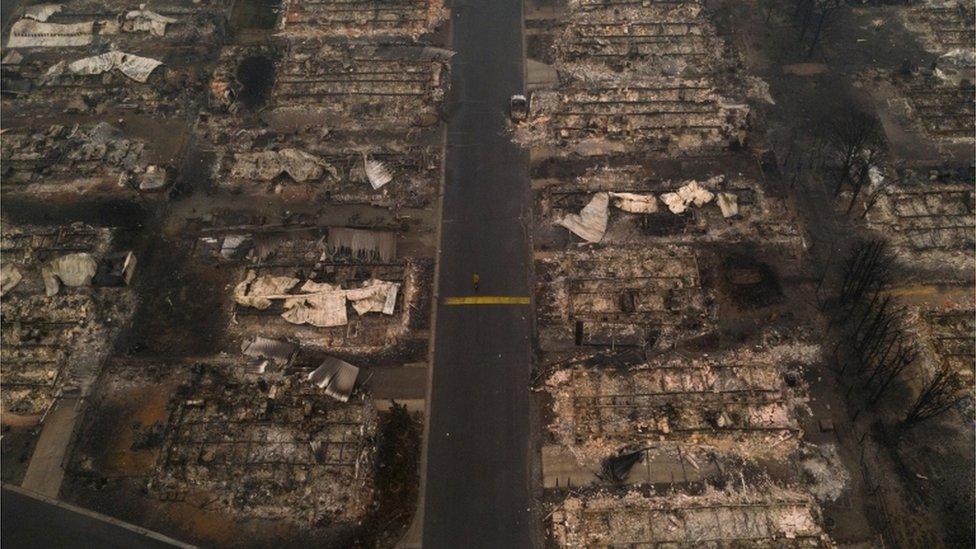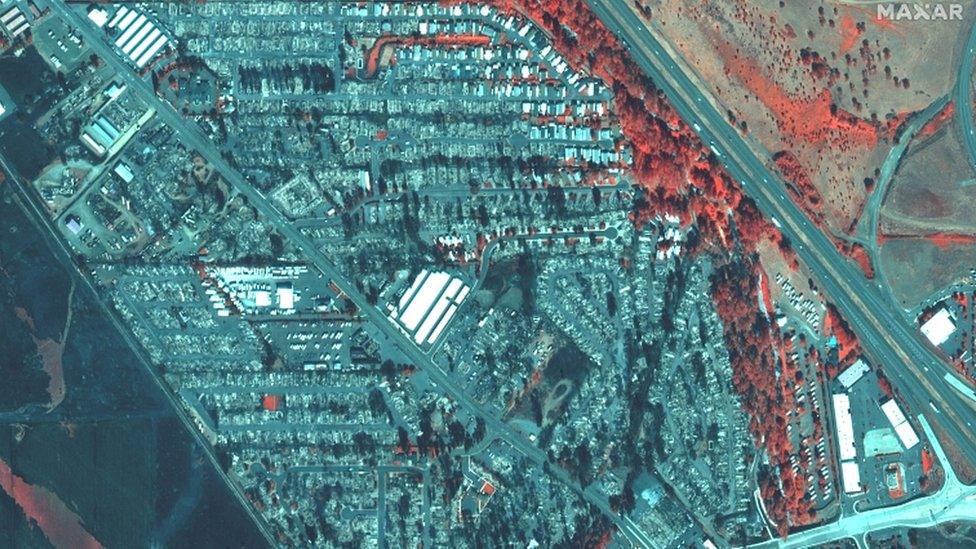Oregon wildfires: Dozens of people missing in deadly blazes
- Published
Drone footage shows homes completely wiped out by wildfires
Dozens of people are missing in Oregon wildfires that have displaced tens of thousands of people, Governor Kate Brown has said.
She implored householders to stay out of the fire zones despite reports of looting.
Oregon's emergency management director Andrew Phelps said they were braced for a "mass fatality event" from the fires.
The infernos have killed at least four in Oregon and 11 elsewhere. One hundred blazes are now scorching 12 US states.
What did the governor say?
She told reporters on Friday: "As of now, there are early reports from our state police that there are dozens of missing persons related to the fires specifically in Jackson, Lane and Marion counties."
She did not offer further details on the missing persons.

The governor, a Democrat, also clarified that 40,000 Oregonians were under mandatory evacuation orders.
State officials said a day earlier that half a million people were affected. But Ms Brown said on Friday the higher figure included those who remained at home but had been advised to be ready to evacuate.
Ms Brown added: "I know that rumours of looting are extremely alarming and that it's unsettling not to know whether your home is still standing.
"Let me assure you that we have the Oregon National Guard and Oregon State Police monitoring the situation and preventing looting."
Police in Marion County, south of Portland, arrested two men after a car chase on Thursday for allegedly breaking into and looting evacuated homes in the area.
The governor noted that federal aid had been approved, which will help provide additional support in fighting the fires and caring for those displaced.
What's the situation in Oregon?
Oregon's forestry department fire protection chief Doug Grafe said on Friday firefighters were still battling 16 large blazes, but cooling temperatures and additional moisture in the air are helping efforts.
Beatriz Gomez Bolanos, 41, told Reuters of her family's frightening drive to safety through fires burning on both sides of their car.
She instructed her four children to close their eyes as they made their escape.
"Everything is gone. We have to start again from nothing, but we are alive," she told the news agency.
At least one blaze in Oregon - the Almeda Fire, one of the most destructive in the state - is being treated as suspected arson.
A 41-year-old man described by police as "a local transient" was arrested on Friday on suspicion of starting a large fire that threatened several homes, reports KVAL-TV, external.
But investigators said that arrest was separate from the main inquiry into the Almeda fire, which has been linked to at least two deaths and destroyed hundreds of homes in the towns of Phoenix and Talent.
The smoke pollution from the wildfires has left Oregon's largest city, Portland, with the worst air quality in the world, followed by San Francisco and Seattle, according to IQAir.com, external.


While natural factors such as strong winds have helped the spread of these massive fires, the underlying heating of the climate from human activities is making these conflagrations bigger and more explosive.
Nine of the world's 10 warmest years on record have occurred since 2005, and the UN warned this week that the five years from 2016 until this year will very likely be the hottest such period yet recorded. Both Oregon and California have warmed by more than 1C since 1900.
The sustained warmth has seen six of the 20 largest fires on record in California all occur this year. In Oregon, the spate of fires has burned nearly twice the average annual losses in just the past week.
In California, a prolonged drought over the past decade has killed millions of trees, turning them into potent fuel for the fires. Mountain regions that are normally cooler and wetter have dried out more rapidly in the summer, adding to the potential fuel load.
Climate scientists had forecast that western wildfires would grow in size, scale and impact - but their predictions are coming to fruition faster than expected.

Among the victims in Oregon are a young boy and his grandmother. The pair were killed in a wildfire near Lyons, 70 miles (110km) south of Portland.
Twelve-year-old Wyatt Tofte, his dog, and his grandmother Peggy Mosso died in the family car trying to escape the blaze. His mother was found severely burnt.
Lonnie Bertalotto, Ms Mosso's son and Wyatt's uncle, confirmed the deaths in a Facebook post, external. "Don't take anything in life for granted and make the best of everyday," he wrote.
Mr Bertalotto told the Oregonian newspaper, external what exactly happened remains unclear, but the family believes Wyatt tried to get his grandmother out of the car, but she had a broken knee and was unable to move.



An infrared image shows destroyed homes in Phoenix, Oregon: burned vegetation and property appear grey, surviving vegetation is in red
What is the situation elsewhere?
Along with Oregon, California and Washington state are the worst affected.
Around 4.5m acres - an area slightly smaller than Wales - have been burned, according to the National Interagency Fire Center.
In Washington, the state's largest wildfire in Okanogan county caused the death of a one-year-old boy as his family tried to escape the blaze. His parents remain in critical condition.
Five ways that show the scale of California's 2020 wildfires
In California, the death toll continues to rise. Authorities in Butte County, north of the capital Sacramento, said 10 bodies have been found in the last two days. A 16-year-old boy is among those reported killed in the fire.
Another 16 people are reported as missing.
The North Complex Fire, which has been burning since 18 August, is among the deadliest in history, the California Department of Forestry and Fire protection reports.
The nation's most populous state has seen at least 20 deaths in total from fires since 15 August, when the first series of blazes began, according to Cal Fire, the agency handling the wildfires.
Over 3m acres have burned in the last month, the most in a single year according to the Los Angeles Times.
Tens of thousands of people were under evacuation orders in the Golden State as 14,800 firefighters continue to combat 28 major fires.


Have you been affected by the US wildfires? Share your experiences by emailing haveyoursay@bbc.co.uk, external.
Please include a contact number if you are willing to speak to a BBC journalist. You can also get in touch in the following ways:
WhatsApp: +44 7756 165803
Tweet: @BBC_HaveYourSay, external
Please read our terms & conditions and privacy policy
If you are reading this page and can't see the form you will need to visit the mobile version of the BBC website to submit your question or comment or you can email us at HaveYourSay@bbc.co.uk, external. Please include your name, age and location with any submission.
